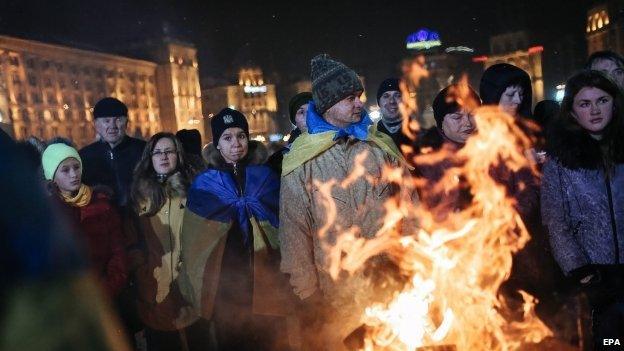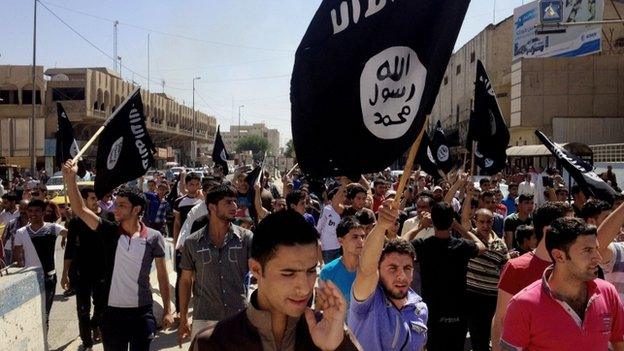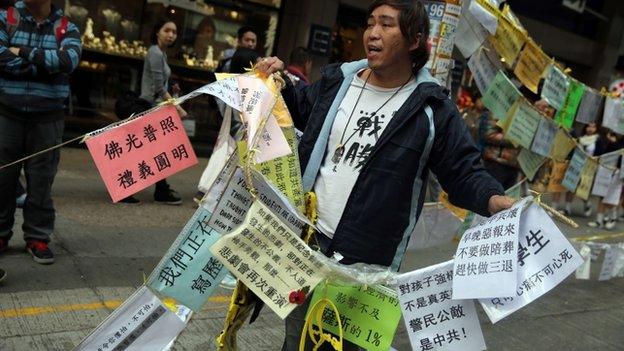John Simpson: 2014 was the year of self-doubt
- Published

One year on, protests continue in Ukraine
Years are like city crowds: for the most part they push their way past you in the street without leaving any real impression.
A few, though, imprint themselves heavily on your consciousness, and on history.
2014 was just such a year. Its events jolted us out of our lazy assurance that things will carry on pretty much as usual.
Here are some of them.
On the night of 21 February the violent clashes in Ukraine between the pro-Russian government of President Yanukovych and demonstrators in the streets who wanted Ukraine to join the European Union and Nato reached a climax
The demonstrators in the Maidan, Kiev's central square, threatened to take up arms against the government. The riot police withdrew, and President Yanukovych fled to Russia, external
A right-wing coup d'etat or a popular revolution? The Russians, the Europeans and Americans naturally disagreed
Soon, the Crimean peninsular was blocked off by soldiers who wore Russian uniforms, but claimed to be local volunteers.
Crimea, which had always seemed like a detached part of Russia anyway, voted, external (genuinely) to join the Russian Federation. Russia was overjoyed.
In eastern Ukraine, there was outright civil war, external, with Russian forces taking part under various guises.
An Malaysian Airlines flight from Amsterdam to Kuala Lumpur crashed after being hit by a Russian-made missile as it flew through Ukrainian airspace. The 298 entirely innocent people on board died.
Unprecedented events
These things were unprecedented in Europe, and the US, the EU and various other countries and international organisations started imposing sanctions on Russia to punish it.
Increasingly damaged economically, external, Russia became more strident in its defiance of the West. It was the start of a second, though milder and less dangerous, Cold War.
But 2014 still had its chief shock in store.
On the night of 9-10 June a motorised column of 1,300 not very well trained religious extremists charged into one of Iraq's biggest cities, Mosul, and captured it.
People across the world suddenly became aware of the black flag of Islamic State (IS). An extraordinary force had been unleashed in Iraq as well as Syria, and threatened to spread across entire sections of the Muslim world.
The Iraqi army, and particularly its officers, simply ran for it. The next day the black flag was flying over the city of Tikrit as well. IS seemed set to capture Baghdad itself.

IS took over the Iraqi city of Mosul
But Baghdad stood firm. IS went on to capture headlines rather than towns and cities, carrying out a series of disgusting murders of defenceless prisoners, skilfully filmed and set to music.
Gradually, the opponents of IS pulled themselves together. The highly sectarian government in Iraq changed. An unlikely, unspoken coalition of Western countries, Iraqi Kurds and Iran joined Syria in fighting IS.
Now, no one seriously thinks the black flag will fly over the entire region; but IS is influencing and attracting extremists in countries from Pakistan to Libya, and in Nigeria the crazy-seeming Boko Haram movement is copying its worst features.
There were moments in 2014 when it looked as though the world might succumb to another pandemic: this time Ebola.
In fact it was never really on the cards, partly because the world's medical resources were too strong, and partly because the disease itself didn't quite lend itself to that kind of spread.
Year of turnarounds
Still, it terrified a lot of people; and as always in these circumstances governments and individuals didn't always behave wisely or decently.
It was a year of turnarounds. Britain and the US, having apparently pulled out of Iraq and Afghanistan, found themselves sending soldiers back there to shore up the local forces.

Protestors in Hong Kong opposed Chinese Government attempts to impose central control
Separatist feelings grew in Europe, whether in Scotland or Spain, or expressed as a dislike of the European Union itself.
In Hong Kong, the desire to keep a separate identity, external has goaded China into a new sternness, while President Xi Jinping has continued to show a steely determination to assert his control over the Communist Party.
As 2014 fades, some of the big world issues seem to be reflected in the streets. Deranged characters from Sydney to Dijon and Tours have attacked people in the name of Islam. Racist assaults on Muslims have increased.
In Britain, policemen and politicians alike worry that terrorist attacks are inevitable. In the US, trust in the police has been severely shaken by a series of deaths of black people at the hands of individual policemen.
Time magazine has decreed that 2014 was the year of the selfie. Maybe.
To me it seems it was the year of nervousness and instability. The real selfie of 2014 was self-doubt.